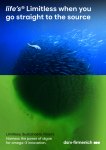Casein, whey formulas reduce infants' allergy risk
of developing them themselves if they are fed hydrolyzed casein or
whey formulas in place of cow's milk based formulas when
breast-feeding is not possible or inadequate, according to a review
study.
A baby is considered to be at risk of developing allergies when one of its parent suffers from them. When both parents or a sibling suffers from allergies, the baby has a 70 percent chance of developing them.
The study, published in the September issue of the Archives of Pediatric and Adolescent Medicine (2005 Sep; 159(9):810-6), reviewed 32 papers investigating the role of hydrolyzed infant formulas in allergy prevention.
All of prospective controlled trials, published in peer-reviewed journals in the English language since 1985, were carried out using human subjects. Nine used extensively hydrolyzed formulas, 12 used partially hydrolyzed formulas in high-risk infants, and one used partially hydrolyzed formulas in a random group of infants.
The researchers, from the Division of Pediatric Gastroenterology and Nutrition at The Johns Hopkins University School of Medicine, saw that infants fed extensively hydrolyzed casein formulas or partially hydrolyzed whey formulas had reduced incidence of atopic (hereditary) disease in their first five years, compared with those fed cow's milk formulas.
None of the studies showed that any hydrolyzed formulas increased the risk of allergies.
"Extensively hydrolyzed casein formulas and partially hydrolyzed whey formulas are appropriate alternatives to breast milk for allergy prevention in infants at risk," they concluded.
However they emphasized that the best course of action for infants at risk of allergies was breast-feeding for the first 12 months, and that the hydrolyzed formulas are a recommended course of action only in instances where breast-feeding was not possible or inadequate.
The difference between extensively and partially hydrolyzed formulas is that the former can be used for both treatment and prevention of allergies, whereas the latter is not suitable for infants who may have already developed allergies, since there is a chance they may react to it.
The extensively hydrolyzed formulas are generally more expensive than cow's milk and partially hydrolyzed whey formulas however, have a different taste.











